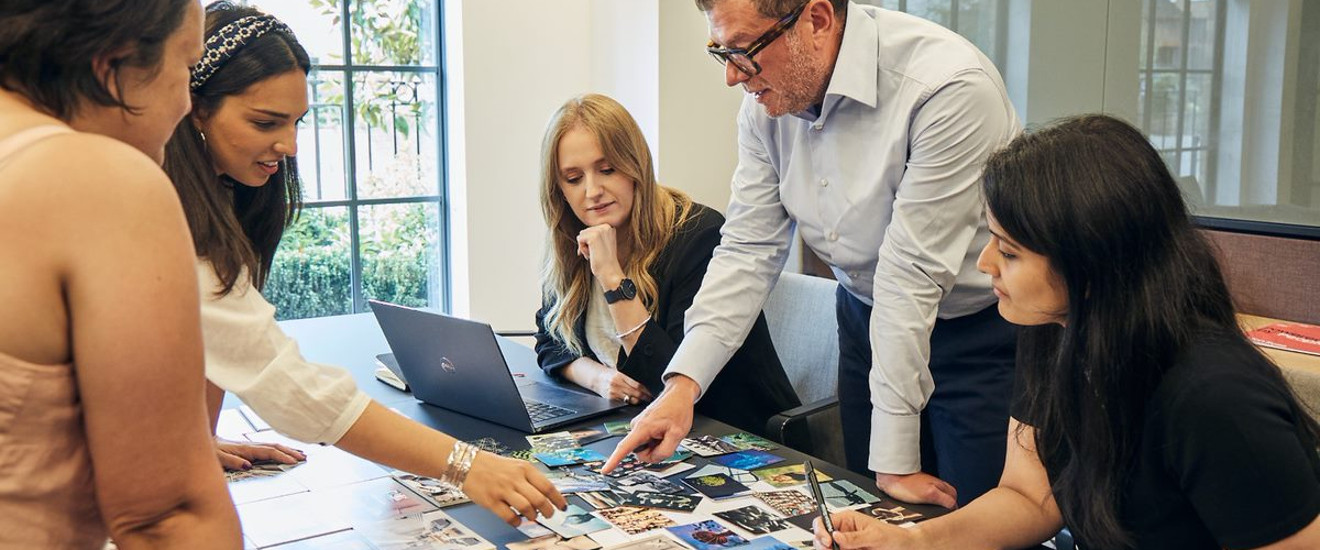5 office design trends for 2025
Explore the top 5 office design trends for 2025 and learn how to create purposeful, future-ready workspaces...

Head of Workplace Strategy, Leeson Medhurst, spoke to us about why now more than ever, strategy will shape the future of work.
It has become a very crowded marketplace exposing some risks; too many people want to start designing before the data, it’s vital to remember that workplace consultancy isn’t design, its data analytics – before we have data and fact, you are working with opinions and beliefs. I understand the driver behind why many begin designing from the early stages, it’s the fun and tangible part, and is actually the easier win.
The evolving market, and people in the industry in turn have lost sight of what qualified workplace consultants do – this is where the market has become crowded. We saw this come to life when Covid-19 hit the UK in March 2020, the commentary started with “the office is dead and had no future…” we all knew that wasn’t the case.
What has happened is the pandemic has accelerated the adoption of the best practice we have been delivering for years. It’s framed that people now have choice, in all aspects of life, and this is the case with returning to the workplace. Why do I need to go to the office, what is its purpose, what is in it for me, do we need an office?
The concept of ‘no office’ does exist, it is a real phenomenon. For some leaders, big questions will need to be answered about why they have large enterprise spaces half empty, eating up operational and capital expenditure. How can that space or lease be reengineered or reimagined? The choices we have are limitless and create unrivaled and exciting opportunities. Never has there been a more exciting time within the workplace arena.
Our role as true Workplace Consultants is to demonstrate why a client should want an office – not why they should have one. The opportunities of having an office far outweigh the capital benefits of not having one.
Unless there is a compelling event to change behaviour, this takes a leap of faith by business leaders. Covid-19 has given us real life proof of concept, we have proven through this forced ‘social experiment’ that a remote workforce works – because we’ve had to, and that performance hasn’t declined.
Of course, we must factor in some considerations, understanding that wellbeing priorities vary at every life stage. What we will learn from Covid-19, is to not just accept that people can work from home. For people who are in flat shares for example, it’s not doable in the long term. A good home working environment comes later in life, when you’re likely to have more space and a garden.
The past year has opened our eyes to more opportunity, the market won’t see big disaster recovery sites – because people will just work from home. It does add pressure on employers to ensure that the employee’s work from home is set up properly, their duty of care must extend beyond the office.
The future has given us more opportunities, it has opened the eyes of organisations across the globe, we have more choice upon us to make more decisions – an informed choice.
It’s simple, because we will forget the important lessons we have learned. As humans, we very quickly forget – look at March to May 2020 when we were craving that social interaction, we remember it, but we have forgotten how bad it was. If we don’t act now, there is a risk that we will migrate back to the workplace and go back to exactly what we did before March 2020.
It takes 30 days to create a new habit, unless you enforce the habit we will lurch back to where we were. If businesses don’t have a compelling event in the near future, such as a lease break, some businesses won’t have the opportunity to address their workplace strategy, and that would be a real shame.
For example, if a company carried out a new fit out in the past two years, they could have eight years until their next compelling event – those who are at most risk who have limited opportunities and budget.
There are two scenarios that I find clients haven’t considered – those with multiple site locations can explore the possibility of reducing their footprint or property assets. We recently worked with a client that had multiple sites, and we realized that adopting a more agile way of working and reducing their assets can create a huge saving for the client.
Secondly, clients who have long term growth strategies and want to retain their space but haven’t yet considered sub-letting their space in the interim. This not only saves on excess costs but can even create an additional income stream.
Desire and passion for the future of the workplace. My ambition for Peldon Rose and the workplace strategy team is to become the go to provider of knowledge about the workplace within the London market… and beyond!

Explore the top 5 office design trends for 2025 and learn how to create purposeful, future-ready workspaces...

Cat A, Cat B and Cat C office fit outs are tailored to your business’s needs and goals. Find out which one...

Streamline your office move with our complete relocation guide — checklists, expert tips, and step-by-step...

Learn all about workplace engagement, including the benefits of an engaging workplace and strategies for...

Your workplace holds enormous potential to improve your business performance. Get in touch today, and we will unlock that potential together.